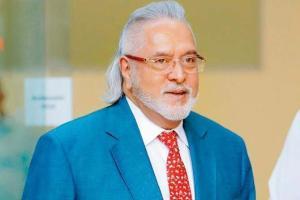Mallya, accused of defaulting on loans of over Rs 9,000 crore, was on January 5 declared a fugitive economic offender (FEO) by special Judge M S Azmi of the Prevention of Money Laundering Act (PMLA) court

Vijay Mallya
Businessman Vijay Mallya's claim that the Indian government's efforts to extradite him were a result of "political vendetta" was "mere fiction of his imagination", a special PMLA court observed in its order. Mallya, accused of defaulting on loans of over Rs 9,000 crore, was on January 5 declared a fugitive economic offender (FEO) by special Judge M S Azmi of the Prevention of Money Laundering Act (PMLA) court.
ADVERTISEMENT
The judge, in his order that was made available to media Saturday, said, "Mere statement that the government of India had pursued a political vendetta against him and initiated criminal investigations and proceeding against him cannot be ground for his stay in UK." Besides these bare statements, there is nothing to support as to how the government of India initiated investigation and proceedings to pursue political vendetta, the judge said in his order. "Hence the arguments in these regards are mere fiction of his imagination to pose himself as law abiding citizen," he added.
The court said the date of Mallya leaving India was March 2, 2016, and on that day admittedly there was offence registered by the Central Bureau of Investigation (CBI) and the Enforcement Directorate (ED). Mallya laid much stress on the fact that he went to attend a motor sports council meeting in Geneva on March 4, 2016. "Had it been the case that he went to attend a pre-schedule meeting and is a law abiding citizen, he would have immediately informed the authorities about his schedule to return to India after attending his meeting and commitment," Azmi observed.
Therefore, in spite of repeated summons and issuance of warrant of arrest, he had not given any fix date of return, therefore it would be unsafe to accept his argument that he departed India only to attend a pre-schedule meeting, he said. The judge stated that the ED application cannot be read in "piece meal" and must be read as whole. The satisfaction or the reasons to believe by ED that Mallya was required to be declared as an FEO appears to be based upon the foundation that despite repeated efforts, he failed to join investigation and criminal prosecution.
Even the efforts taken by way of declaring him as a proclaimed offender have not served the desired purpose, he added. Azmi said the intention of the FEO Act is to preserve the sanctity of the rule of law and the expression "reason to believe" has to be read in that context. The reasons supplied by the ED were the amount involved-- Rs 9,990 crore, which is more than Rs 100 crore which is the requirement of the Act. As pointed out, the summons issued were deliberately avoided, passport was revoked, non-bailable warrants were issued and he was also declared a proclaimed offender, the judge said.
These appear to be sufficient reasons to declare him an FEO, the judge observed. Mallya is the first businessman to be declared an FEO under the FEO Act which came into existence in August 2018. The ED, which had moved the special court for this purpose, requested the court that Mallya, currently in the United Kingdom, be declared a fugitive and his properties be confiscated and brought under the control of the Union government as provided under the act.
Catch up on all the latest Crime, National, International and Hatke news here. Also download the new mid-day Android and iOS apps to get latest updates
This story has been sourced from a third party syndicated feed, agencies. Mid-day accepts no responsibility or liability for its dependability, trustworthiness, reliability and data of the text. Mid-day management/mid-day.com reserves the sole right to alter, delete or remove (without notice) the content in its absolute discretion for any reason whatsoever
 Subscribe today by clicking the link and stay updated with the latest news!" Click here!
Subscribe today by clicking the link and stay updated with the latest news!" Click here!







